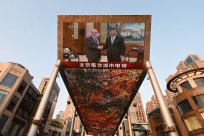On December 29 last year in South Africa, in the International Court of International Courts, in response to the Action of Israel in the Gaza Strip, a lawsuit was filed, saying that the latter "the latter" the Palestinian people who will be a nation, race and national group in the Gagsa Strip in a broad sense will be destroyed for destruction"Specific intention", therefore "characteristics of destroyed".According to this, South Africa claims that Israel violates the obligations of prevention and punishment based on the Convention on the Convention on Preventing and Punishment of Extraordnance.South Africa particularly emphasized that prosecution is also to fulfill its prevention obligations that it is based on the Convention.
At the moment when Israel was criticized and accused by the world's criticism in Gaza, how should the prosecution behavior of South Africa be evaluated?
Frankly speaking, this prosecution in South Africa is both a farce, but it is also meaningful. It describes it as a serious "farce", which should be generally accurate.
First of all, South Africa's description of the Palestinian in the request has problems with the legal positioning itself; on the other hand, it is difficult for South Africa to prove that Israel's action in the Gaza Strip has a "destroy" intention.Based on these two reasons, the case will basically "stay" in the prerequisite opposition, and will not enter the trial stage of physical problems.
Nevertheless, South Africa's prosecution is not meaningless and effective.As South Africa also requested the International Court to issue temporary measures order orders, there is no doubt that considering the situation of the case, the international court will generally indicate certain temporary measures in the case of no controversy in jurisdiction (but but but howeverIt does not rule out some exceptions).Once a certain temporary measure is instructed, even if Israel knows that the case will not go "too far", it is unlikely to ignore these temporary measures completely.
From the perspective of legal effects and possible issues, the positive significance of South Africa's prosecution is: on the one hand, there may be partial prevention and punishment of the convention of the crime of extinction race.nation.Once there are other countries participating, considering that some countries have complained about the participation of the Myanmar case in Gambia and the Ukraine case in the Russian case, these countries' interpretation practice around the specific terms of the Convention is worthy of high attention.But on the other hand, in the case of South Africa knowing that the proceedings of the case may die halfway, they still chose to start a lawsuit. Does this behavior constitute the abuse of procedures?
Is the allegations of destroying South Africa, is it a political allegations or legal allegations?How can the relationship between the two understand and position the legal charges and political allegations?Once more national imitation, what does it mean for the relationship between the country and the international court?After all, from the perspective of at least five years of judicial practice, there are already several allegations between the country's country that are being tried.How can we understand and evaluate these cases?
Another problem is the right to appear in South Africa.Theoretically, because South Africa and Israel to prevent and punish the State of the Convention on Extraordinary Race, and the state's obligations based on this Convention are of all, each convention isWith common interests, there is generally no problem in court.However, due to the close relationship with the existence of "disputes", how to prove that South Africa proves that there is a dispute around the convention's interpretation and adaptation, which should also be the key to the problem.
If the existence of "disputes" cannot be effectively proved, even if South Africa enjoys common interests, it is difficult for the right of court to be fully supported by the international court.In this regard, although South Africa issued corresponding diplomatic photos to Israel for this, and expressed the concerns of South Africa to South Africa in South Africa. Whether these measures can constitute sufficient evidence of "disputes" in each other.The ruling is worthy of attention.
The author is a professor of international law at the School of Law School of Zhejiang University of Technology


